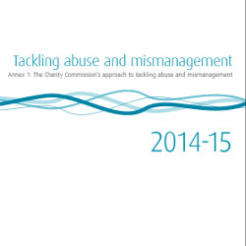The Charity Commission opened 103 statutory inquiries in the year to March 2015, up from 64 the previous year, it revealed in its annual publication summarising its regulatory activity.
Over recent years the regulator said it has increased efforts to prevent and stop charity abuse. Last year it used its powers 1,200 time, slightly down on 2013/14, but up from 216 two years ago.
In 2014/2015, the regulator opened 400 new monitoring cases and increased the number of inquiries from 15 in 2012/13 to 103.
The Charity Commission has warned against the presence of dominant individuals on charity boards, in its annual publication, Tackling Abuse and Mismanagement. It said that dominant characters on the board pose a serious risk to charity governance – including how other trustees carry out their legal duties.
Michelle Russell, director of investigations, monitoring and enforcement for the Charity Commission said dominant characters can cause fellow trustees to “disengage, fail to contribute to or challenge ideas or decisions”.
“The impact of dominant individuals is one of those underlying factors that we know can hinder good governance,” she said.
“Strong leadership is important, and often charities rely on the passion, drive and volunteer time of key individuals but when they are allowed excessive power or influence within a charity, other trustees… are not given the opportunity to use the skills and expertise they have and are not fully discharging their legal duties.”
Russell said charities with strong individuals in leadership positions, also run the risk of “unmanaged conflicts of interest or unauthorised personal benefit”.
The report is part of the regulator’s aim to help charities identify the “root causes of poor governance”.
The report sets out the Commission’s wider work to prevent and stop abuse by “improving the proactive monitoring of charities that fall into certain risk categories”, “increasing the number of inquiries into charities” and “using its powers more swiftly, robustly and effectively”.
“Our case work shows that serious problems often arise because of basic failures of governance. So it is important that we identify the cultures and behaviours that prevent trustees collectively from doing a good job, and share these insights with trustees,” said Russell.
Financial abuse
The report also highlights concerns about financial abuse – warning that financial crime and mismanagement feature heavily in the regulator’s compliance caseload.
Last year, some 42 out of the total 53 investigations, raised concerns about financial management. It also featured in 398 completed compliance cases.
In the report’s introduction. Charity Commission chair, William Shawcross said: “Public trust in charities is high, but must never be taken for granted. Most charity trustees take their legal duties and responsibilities seriously. Only a small proportion of the 165,000 charities on our register ever become subject to an investigation or compliance case.
"Abuse or non-compliance of any kind in just one charity, however, can damage public trust in and the reputation of the entire charitable world, whether the abuse is deliberate or arises through mismanagement or neglect."









